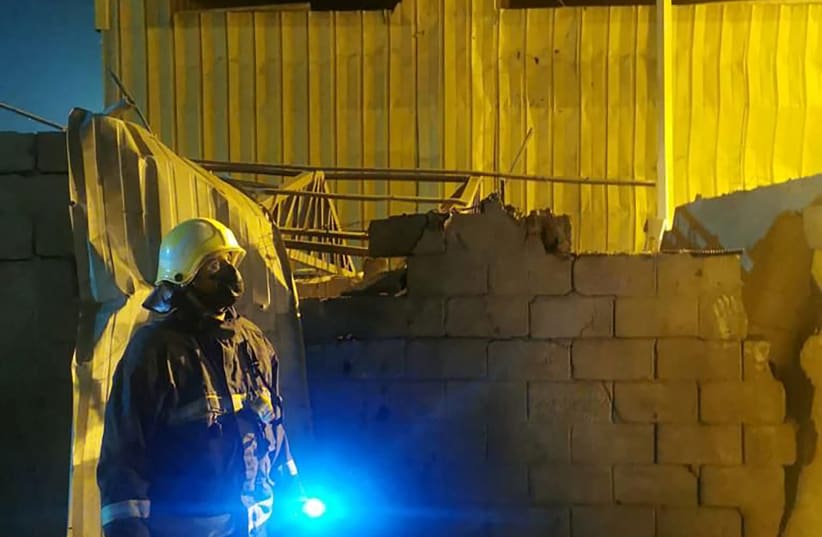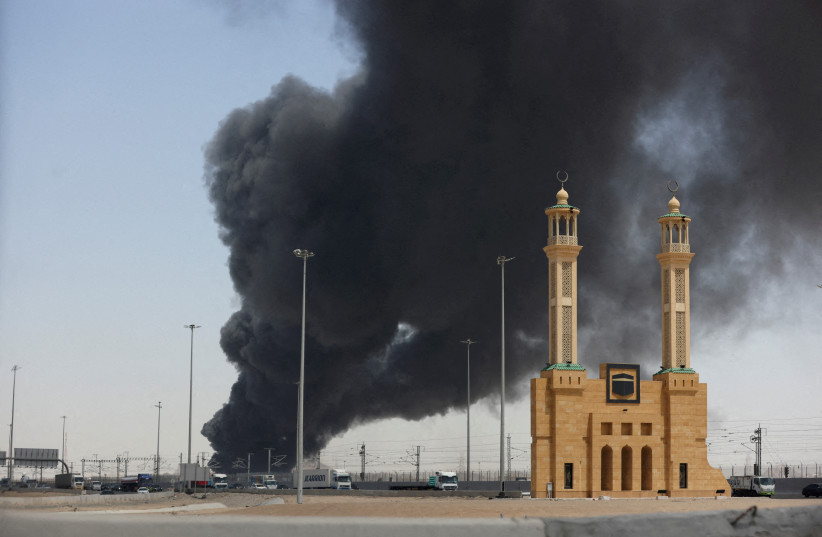The support that Prime Minister Naftali Bennett gave Saudi Arabia following attacks by the Iranian-backed Houthis is a signal to Iran. Israel is paying attention to the Houthi attacks, Iran’s Fars News Agency reported. Iran puts on a brave face here, claiming that the “Zionists acknowledge” the power of the Houthis.
That Iran can mobilize the Houthis against Israel has been known for years.
In January 2020, for instance, reports emerged that Iran had staged drones in Yemen with a range that could put Israel in danger. Moreover, there have been increasing comments from the Houthis threatening Israel. The Houthis’ official slogans are “Death to Israel” and “Curse the Jews.” But that is rhetoric, and actual Houthi threats have emerged more recently.
The Houthis’ threats are backed up by their capabilities, including their long-range missiles and drones. Last year, a drone was used by Iran to attack a ship in the Gulf of Oman. Overall, the idea of Iran is to put in place a threat against shipping off the coast of Yemen and Oman.
Iranian media spread conspiracies about Israel’s interest in Yemen and about Israel-United Arab Emirates ties.
The overall picture is that Iran knows there is an Israel angle to its role in Yemen. It now openly acknowledges this but tries to make it seem that Israel is afraid of the Houthis.
“The State of Israel expresses its sorrow to the Kingdom of Saudi Arabia after the horrific attack by the Iranian-backed Houthis,” Bennett wrote on Twitter, Al Arabiya in Saudi Arabia reported over the weekend.
Iran believes it can operationalize the Houthis as a regional threat. Tehran has paid close attention to Israel’s N12 reporting that as the threats from the Houthis increase, cooperation between the Gulf states and Israel will increase.
“The two Gulf states are currently seeking a response to these threats,” Fars reported. This indicates that Saudi Arabia and the UAE are seeking responses. This comes after widespread Houthi attacks on Saudi Arabia targeting Jeddah and other areas. These attacks even threatened the Formula 1 race held in Saudi Arabia on Sunday.
Other factors exist. The Houthis have targeted the UAE as well. In addition, the US has been showing Riyadh the cold shoulder in recent months. However, at the same time, the Negev Summit with the UAE, Morocco, Egypt, Israel and Bahrain, as well as the US, is a symbol of the unified front between the Abraham Accords states.
The overall context now includes Iran’s understanding that its increased attacks on Saudi Arabia and the UAE could not only move those countries closer together regarding Yemen but also draw Riyadh closer to Israel. This overall process has been on display since 2015, but the public meeting in the Negev is a symbol of a new era.
Saudi Arabia is weighing this new era. Riyadh and Abu Dhabi had some differences over Yemen over the past two years. But the Houthi attacks on Saudi Arabia and the UAE in recent months illustrate Iran’s increased use of the Houthis to attack others.
Tehran also knows that US Iran envoy Rob Malley said in Doha a deal with Iran might not actually happen. While he was not confident a new deal would actually happen, he also said the US would maintain sanctions on the Iranian Islamic Revolutionary Guard Corps.
Iran now understands that without a deal, its need to pretend that it isn’t destabilizing the region can be reduced. In short, it can now lift the veil on more attacks beyond the recent ones on Jeddah in Saudi Arabia and on Erbil in Iraq.

